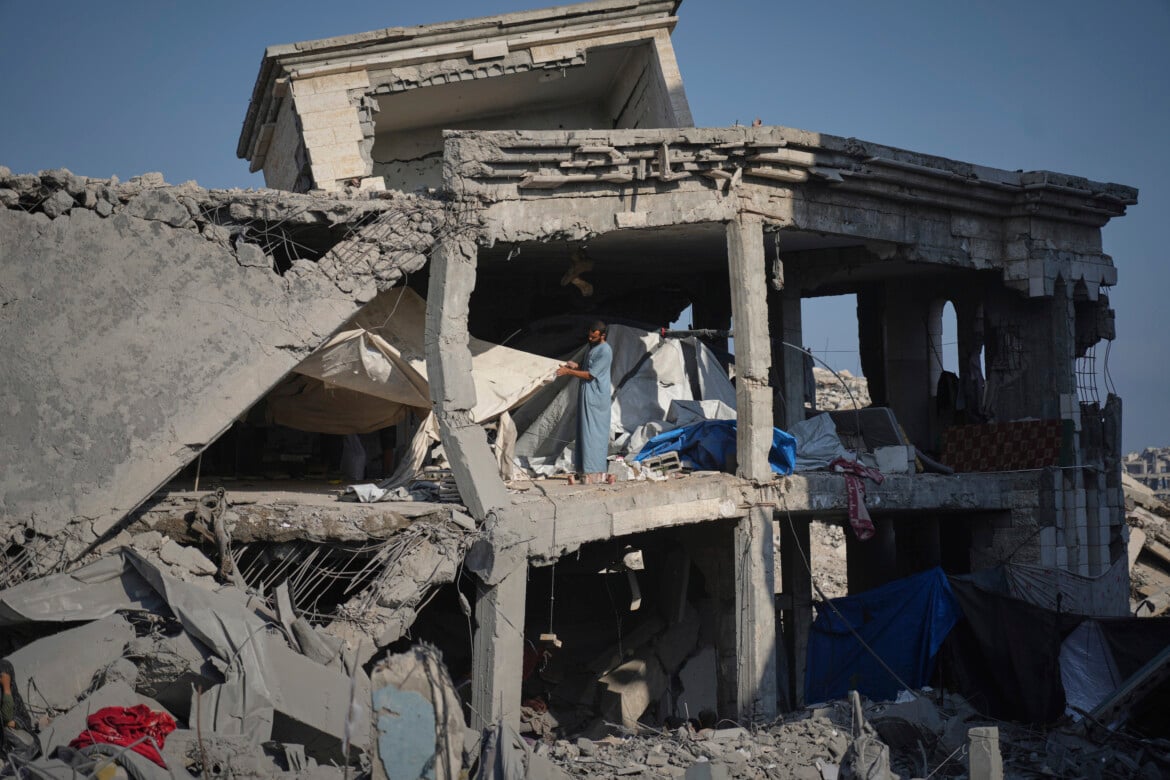Report
Testimony from Gaza: Israel cannot kill collective memory
My grandfather’s house, once full of laughter and memories, was destroyed after the occupation of Zeitoun, leaving empty streets that now hold only memories. It has become the symbol of an even greater crime: cutting off people from their roots.

Leaving Gaza was never a choice, but a matter of survival. Last year, the roads leading south were already clogged with families carrying what they had managed to salvage from their lives. For us, leaving meant saying goodbye to my grandfather's house, the house that held the memories of generations, now standing alone amid the rubble.
Because of my university studies, I often moved within the Gaza Strip, between the south, north and the city center. Life was beautiful back then, surrounded by relatives in my grandfather’s house. Every month, when we visited the Zeitoun neighborhood, we would pass along a long road lined with groves of oranges, tangerines, and olives. I always carried that sight in my heart on the way to my grandfather’s house, the place where my aunts, cousins and siblings gathered, where laughter and stories filled the air.
But in Gaza, joy is always fragile and fleeting, overshadowed by the fear that something terrible is just around the corner. And so it was: the day came when my grandfather's house was swept up in the wave of displacement to the south. The family scattered, the houses were destroyed – all except for my grandfather's, which stubbornly resisted despite the bombings. It was no longer safe to live in, yet it remained, a witness to memory.
When the ceasefire was announced in January, I went to see it. There it was, standing among thousands of destroyed houses, the only survivor in a sea of rubble. The sight hit me hard – but, as always in Gaza, the relief was only temporary.
Now Israel is telling the residents of Gaza City, especially in the Zeitoun neighborhood, to evacuate immediately and head south. My aunt, who lived near my grandfather’s house, tried to stay. She barricaded the entrances and patched up the walls with tarps to protect herself and her children after losing her husband. But when the tanks advanced and bullets began to fly, she was forced to flee once more.
She had already been displaced in November 2023, forced to leave with nothing. At the time, she said she had learned her lesson and that next time she would take everything she could. But history repeated itself: she wasn’t able to take anything. The cycle of departures and losses has continued. Transportation is scarce, fuel prices are astronomical, and moving even a few kilometers has become nearly impossible. Displacement has become more expensive than death.
For the people of Gaza, there is only a cruel choice: die under bombs, die of starvation, or leave their homes, stripped of their dignity.
Over time, the oppression spread. Israel did not limit itself to starving the north but extended its control over the entire Gaza Strip. Buildings are collapsing on their inhabitants, journalists are killed every day, and people are forced to flee, while food supplies are cut off, turning hunger into a tool of collective extortion.
My friend Sara, who lives in northern Gaza, told me: “From the moment they announced the return of the occupation in the north, especially in Jabaliya, we have been consumed by fear. The bombings have intensified. The explosions are constant, rockets fall every minute, robots are breaking into houses and blowing them up without mercy. We feel like we are no longer human. Last night was terrifying. I couldn’t sleep. I prayed, sitting up, trembling at every sound, thinking only: How are we going to evacuate? What can we take with us? How can we leave our home, the only place we have felt even a little bit safe? Even tents are too expensive now: a single one costs 3,000 shekels, about $900. How will we ever get such money? Every day we wake up thinking about leaving. That thought alone is consuming our souls.”
Sara has endured hunger and moved from house to house, always fleeing the bombings. Today, she would rather die than be forced to leave again. This is Gaza: broken hearts, destroyed homes, memories torn away.
Gaza is slowly suffocating. Food is being denied, and its people are forced to barter their dignity for a single piece of bread in exchange for exile. My grandfather’s house, once full of laughter and memories, was destroyed after the occupation of Zeitoun, leaving empty streets that now hold only memories. It has become the symbol of an even greater crime: cutting off people from their roots.
Israel does not only kill with bullets; it kills through hunger and forced displacement, redrawing our map house by house, memory by memory. Yet one truth cannot be erased: houses may fall, bodies may grow tired, but memory endures. My grandfather’s house will remain in my heart and in the hearts of us all as a testament that, no matter how starved or displaced the people of Gaza become, they will never lose their right to their land or to a life of dignity.
Originally published at https://ilmanifesto.it/tra-le-macerie-di-case-e-strade-la-vera-resistenza-e-la-memoria on 2025-09-04
